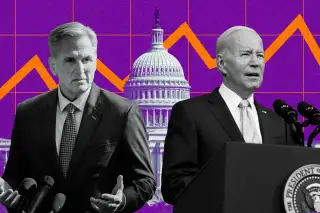Investors Should Brace for ‘Significant Volatility’ as the Debt Ceiling Standoff Continues

Investors are holding their breath as the debt ceiling standoff heats up and experts sound the alarm about a potential default.
The debt ceiling, or debt limit, is the maximum the U.S. federal government is allowed to borrow to meet its financial obligations. Those obligations include Social Security and Medicare payments, money due to government bondholders and creditors, military salaries, tax refunds and more.
There are just two weeks left until the “X-date” — the date when the government could run out of money to meet those obligations. Lawmakers met with President Joe Biden this week to hammer out a deal to raise the debt limit and avoid a default, but they've been unsuccessful so far.
Experts agree that a default would cause serious damage to the economy. Here's what investors need to know.
While experts agree that lawmakers are likely to reach a deal — potentially at the 11th hour — they say the uncertainty over exactly how the debate will play out means investors should brace for a rocky few weeks in the markets.
“Events that cause uncertainty tend to generate market volatility,” says David Li, wealth partner at J.P. Morgan Wealth Management. That can be especially true of political events — the market tends to perform better in the aftermath of midterm elections once results are certain, regardless of the winner, for instance.
In a research note this week, Morgan Stanley strategist Michael Wilson said that while most of his firm’s clients believe that the the debt ceiling crisis will be resolved, the resolution won’t happen “without some near-term volatility.” Moody’s Analytics economists Mark Zandi and Bernard Yaros have taken a similar stance: Raising the debt ceiling will “surely be messy and painful to watch, generating significant volatility in financial markets,” they warned last month.
Wilson notes that historically, not all stocks have performed equally in a debt limit standoff: Energy and utility companies tend to perform well in the leadup to a resolution, while tech, healthcare, consumer staples and dividend growth companies tend to perform well in the aftermath. Of course, prior performance does not guarantee how stocks could perform this time around.
What are the consequences of a prolonged debt ceiling standoff?
An extended legislative battle over raising the debt ceiling is likely to have major economic repercussions, according to Moody's economists, and could include a stock market selloff, widening corporate credit spreads (which are a sign of a weakening economy and higher levels of risk for investors) and a weaker U.S. dollar.
Those potential consequences may be what’s necessary to spur lawmakers to make a deal, they added.
How should investors react to the debt limit standoff?
Most financial experts recommend maintaining a long-term approach to investing.
“Debt ceiling news, for better or worse, can be fluid,” Li says. He cautions his clients against trying to time the market. Instead, Li recommends sticking with a diversified portfolio that is not over-concentrated in a single industry and contains multiple types of assets.
While the headlines may seem scary, it’s important to remember that some level of volatility in the market is normal.
“Volatility in the market is always going to be present,” says Kyle McBrien, a financial planner at Betterment. “Today, it's the debt ceiling. Tomorrow, it could be something different.”
Creating a long-term investing plan is what will help you weather that volatility in the short-term, he says: “The market has always been resilient.”
A U.S. Debt Default Could Send the Housing Market Into a 'Deep Freeze'
What's Going on With the Debt Ceiling? 6 Common Questions, Answered
Are Social Security Payments at Risk if the U.S. Defaults on Its Debt?